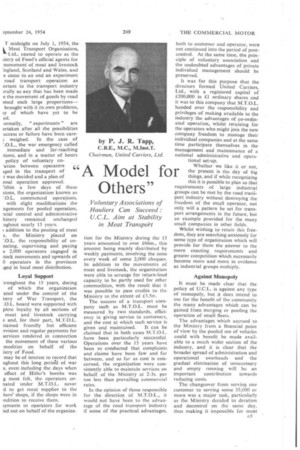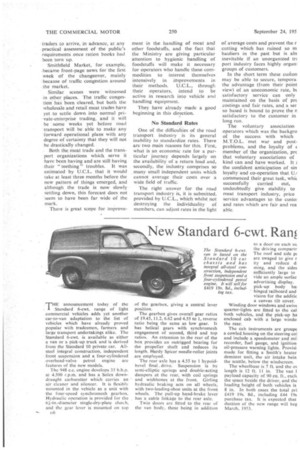"A Model fo Others"
Page 119

Page 120

If you've noticed an error in this article please click here to report it so we can fix it.
.Voluntary Associations of Hauliers Can Succeed : U.C.L. Aim at Stability in Meat Transpoil by P. J. R. Tapp,
C.B.E., M.C., M.Inst.T. Chairman, United Carriers, Ltd. T midnight on July 1, 1954, the
Meat Transport Organisation, 'Ltd„ ceased to operate as the iistry of Food's official agents for movement of meat and livestock i-igland, Scotland and Wales, and e came to an end an experiment road transport operation as ortant to the transport industry rally as any that has been made e the movement of goods by road imed such large proportions— brought with it its own problems, ty of which have yet to be ed.
ormally, " experiments " are ertaken after all the possibilities uccess or failure have been care,/ weighed. In the case of .O.L., the war emergency called
immediate and far-reaching sions, and in a matter of hours policy of voluntary co-ation between operators iged in the transport of t was decided and a plan of onal operation approved. Tahiti a few days of these sions, the organization known as ..O.L. commenced operations, with slight modifications the ngements for pooled operation. lcial control and administrative hinery remained unchanged ughout nearly 15 years.
addition to the pooling of meat s, the Ministry placed on s.O.L. the responsibility of conating, supervising and paying e 2,000 operators engaged in ;tock movements and upwards of 0 operators in the provinces iged in local meat distribution, Loyal Support lroughout the 15 years, during
of which the organization .ated under the control of the istry of War Transport, the .0.L. board were supported with plete loyalty by all sections of meat and livestock carrying a and, for their part, M.T.O.L. itained friendly but efficient [vision and regular payments for services rendered in connection the movement of these various modifies on behalf of the istry of Food.
may be of interest to record that ughout this long periord of war s, evem including the days when effect of Hitler's bombs was
g most felt, the operators conated under M.T.O.L. never d to get meat supplies to the hers' shops, if the shops were in ondition to receive them.
tyments to operators for work ied out on behalf of the organiza tion for the Ministry during the 15 years amounted to over £66m., this amount being mainly distributed by weekly payments, involving the issue every week of some 2,000 cheques. In addition to the movements of meat and livestock, the organization were able to arrange for return-load capacity to be partly used for other commodities, with the result that it was possible to pass credits to the Ministry to the extent of £3.5m.
The success of a transport company such as M.T.O.L. must be measured by two standards, efficiency in giving service to customers, and the cost at which such service is given and maintained. It can be claimed that in both cases M:1_0.1.. have been particularly successful. Operations over the 15 years have been so conducted that complaints and claims have been few and far between, and so far as cost is concerned, the organization were consistently able to maintain services on behalf of the Ministry at 2-3s. per ton less than prevailing commercial rates.
In the opinion of those responsible for the direction OE M.T.O.L., ii would not have been to the advantage of the road transport industry if some of the practical advantages, both to customer and operator, were not continued into the period of post control. At the same time, the principle of voluntary association and the undoubted advantages of private individual management should be preserved.
It was for this purpose that the directors formed United Carriers,
Ltd., with a registered capital of £200,000 in £1 ordinary shares and it was to this company that M.T.O.L, handed over the responsibility and privileges of making available to the industry the advantages of co-ordinated operation, whilst retaining for the operators who might join the new company freedom to manage their individual companies and at the same time participate themselves in the management and maintenance of a national administrative and opera
tional set-up.
Whether we like it or not, the present is the day of big things, and if while recognizing this it is possible to plan so that requirements of large industrial groups can be met by the road Iraniport industry without destroying the freedom of the small operator, not only will a pattern be set for transport arrangements in the future, but an example provided for the many small companies in other fields.
Whilst wishing to retain this freedom, they are searching anxiously for some type of organization which will provide for them the answer to the more exacting requirements and greater competition which necessarily become more and more in evidence as industrial groups multiply, Against Monopoly It must be made clear that the policy of U.C.L. is against any type of monopoly, but it does intend to use for the benefit of the community the many advantages which can be gained from merging or pooling the operation of small fleets.
The advantages which accrued to the Ministry from a financial point of view by the pooled use of vehicles could with benefit be made available to a much wider section of the industry, and it is clear that the broader spread of administration and operational overheads and the gradual elimination of unnecessary and empty running will be an important contribution towards reducing costs.
The changeover from serving one customer to serving some 35,000 or more was a major task, particularly as the Ministry decided to deration and decontrol on the same day. thus making it impossible for meat • traders to arrive, in advance, at any practical Assessment of the public's • requirements once ration books had been torn up.
• 'Smithfield Market, for example, became-front-page news for the first week of the changeover, mainly %because of traffic congestion around the mai-ket.
Similar scenes were witnessed
• in other places. The traffic conges, -Lion. has been cleared, but both the wholesale and retail meat trades have yet to settle down into normal private-enterprise trading, and it will be some weeks -yet before road transport will be able to make any forward operational plans with any
• degree of certainty that they will not be drastically changed.
Both the meat trade and the transport organizations which serve it have been having and are still having
• their " teething " troubles. It was estimated by U.C.L. that it would take at least three months before the new pattern of things emerged, and although the trade is now slowly settling down, this forecast does not -seem to have been far wide of the mark.
There is great scope for improve
tnent in the handling of meat and other foodstuffs, and the fact that the Ministry are giving particular attention to hygienic handling of foodstuffs will make it necessary for operators who handle these commodities to interest themselves intensively in improvements in their methods. U.C.L., through their operators, intend to be active in research into vehicle and handling equipment.
They have already made a good beginning in this direction.
No Standard Rates
One of the difficulties of the road transport industry is its general inability to standardize rates. There are two main reasons for this. First, what is an economic rate for a particular journey depends largely on the availability of a return load and, secondly, the industry comprises so many small independent units which cannot average their costs over a wide field of traffic.
The right answer for the road transport industry is, it is submitted, provided by U.C.L., which whilst not destroying the individuality of members, can adjust rates in the light of average costs and prevent the.r cutting which has ruined so m hauliers in the past but is amn inevitable if an unorganized tr: port industry faces highly organi groups of customers. In the short term these cusion may be able to secure, tempora. the advantage (from their point view) of an uneconomic rate, bi satisfactory service can only maintained on the basis of pia costings and fair rates, and a ser so based is bound to prove the n satisfactory to the customer in long run.
The voluntary association operators-which was the backgro of the success with which M.T.O.L. met war and postproblems, and the loyalty of member of the organization, prr that voluntary associations of kind can and have worked. It i the confident anticipation of sin loyalty and co-operation that U.1 commenced their great task, whit successfully carried out, undoubtedly give stability to meat transport industry, price service advantages to the custoi and rates which are fair and rea able.
























































































































































































































































































































